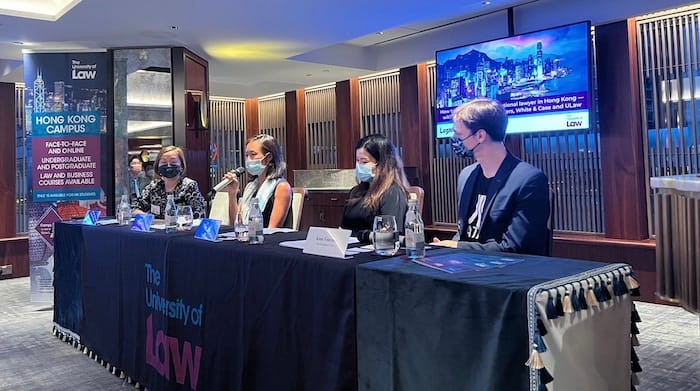Highfliers from the Hong Kong offices of Clifford Chance, Linklaters, White & Case and ULaw discuss what it’s like working in Asia’s world city

The ability to work on cross-border deals for big-name clients as well as the access to mainland China, all make Hong Kong an attractive city to start a legal career. This was one of the key takeaways shared by the speakers at Legal Cheek’s in-person student event held last month in partnership with The University of Law (ULaw) in The Dragon Room of The Hong Kong Bankers Club.
The speakers
• Eunice Leung, registered foreign lawyer specialising in corporate law at Clifford Chance
• Ying Fu, energy and infrastructure partner at Linklaters, co-chair of the firm’s Gender Equality Network in Hong Kong and part of its Asia ESG steering committee
• Jessica Zhou, capital markets partner at White & Case and graduate recruitment partner for the Hong Kong office
• Knut Fournier, US-qualified lawyer and senior tutor at ULaw Hong Kong

Hong Kong’s legal market and status as an international hub
Hong Kong is a global hub for all things business; there are a wide variety of opportunities for lawyers working at international firms in the region. For Eunice Leung, a registered foreign lawyer with Clifford Chance, the opportunity to work on cross-border deals in Hong Kong was an important reason for her move to the region. Leung, who trained and qualified in Australia, shared that her work in Hong Kong is not only more complex, but allows an opportunity to work with colleagues in the UK and US.
White & Case partner Jessica Zhou explained what makes Hong Kong more attractive than other emerging markets in the Asia Pacific region. She shared that Hong Kong’s advantage is that it is the “perfect intersection” of many different markets with its ability to service clients from Hong Kong, mainland China, and internationally, given its basis in common law. Linklaters partner Ying Fu, meanwhile, told the audience of 120 students that she enjoys the diverse and international nature of the work in the firm’s energy and infrastructure department. “No one deal will have the same kind of documentation,” said Fu. “One of the beauties of international legal practice in Hong Kong is that you’re always learning new things when working with international colleagues.”
Being a major financial centre also means Hong Kong is sensitive to geopolitical changes. Whilst Covid-19 was damaging for many industries, legal practice was booming, last month’s event panellists shared. Both Zhou and Fu told the audience that the pandemic years have been the busiest of their careers so far. Zhou explained the rise in activity was due to the increased liquidity and interest in investment during this time. The losses from the pandemic also meant a number of businesses were looking to restructure, which was a boon for related practice areas. Zhou also highlighted the advantage that full-service firms have in Hong Kong, as they provide comprehensive platforms for their clients.
Geopolitical conflicts have also impacted their respective practices, the panellists observed. For example, the Russia-Ukraine conflict has brought to the fore questions related to energy security. This has meant Southeast Asian nations need to secure power from elsewhere to advance their economies. Such a trend is driving investment into the region which is producing work for lawyers like Fu. Energy practices are also particularly attractive in Hong Kong because the investor interest is shifting towards Asia as the European markets mature.
The Russia-Ukraine conflict is also changing priorities for clients in corporate law. Leung said that clients are increasingly worried about the sanctions that states are imposing on foreign investors or companies. ULaw senior tutor and in-house lawyer, Knut Fournier, who appeared on the panel alongside Zhou, Fu and Leung, added that following the closure of the Russian offices of many businesses, investors have started asking questions about business plans in other sensitive regions such as Taiwan.
How students can best prepare to enter the profession
Navigating these complex issues means international lawyers must keep an open mind and be flexible, said Zhou. Keeping up to date with the news and current trends is another important skill that allows lawyers to pre-empt challenges to their client’s business. “News is ‘coffee machine talk’”, said Fournier, adding that any aspiring lawyer must take an interest in the goings-on of the commercial legal world.
Working across borders also requires effective teamwork. Fu told the audience about an international deal she worked on which spanned three time-zones, mentioning that it can be a challenge to coordinate timetables with international colleagues and to be considerate of other team members. “It’s about buying coffee and bagels for that colleague in Paris who you know has done a late night — it goes much beyond legal work”, said Fu, highlighting the relationship-driven nature of legal practice. Fournier agreed with Fu, saying “social skills are as important as technical legal skills”. He continued:
“To hold a project together, international lawyers must learn to anticipate and manage challenges that come with cross-border work, such as differences in drafting styles.”
It can also help to be dual-qualified in this increasingly dynamic and international market. Three out of four of last month’s panel were qualified in more than one jurisdiction and said that adding an extra string to your bow as such can only help to enhance your career and employability. To this end, ULaw is launching a US Bar Preparation Course with Themis this autumn, preparing students in Hong Kong to pass the New York and California bar exams.
Junior lawyers must also make use of any available secondment opportunities, the panel said. Fu, a Linklaters ‘lifer’, who trained with the firm in London before moving to the Hong Kong office, said that secondments allow lawyers to understand ways of thinking that aren’t necessarily like their own. In her opinion, client secondments are also important to learn what clients actually want. “You might draft a detailed email advice, but spending time with clients will make you realise that sometimes all they need is a ‘yes’ or ‘no’ response,” she said.
Between them the firms on the panel offer 36 training contracts a year. To conclude the session, the panel shared advice for students hoping to train at their firms. Zhou reiterated her advice from earlier in the discussion and told students to keep an open mind and be flexible, whilst Fu mentioned the importance of people and relationship skills in the legal profession. Leung advised students to expand their horizons by, for example, travelling or taking up a new skill, and finally, given that Hong Kong firms place strong emphasis on language skills, Fournier advised students to work on these.
About Legal Cheek Careers posts.


